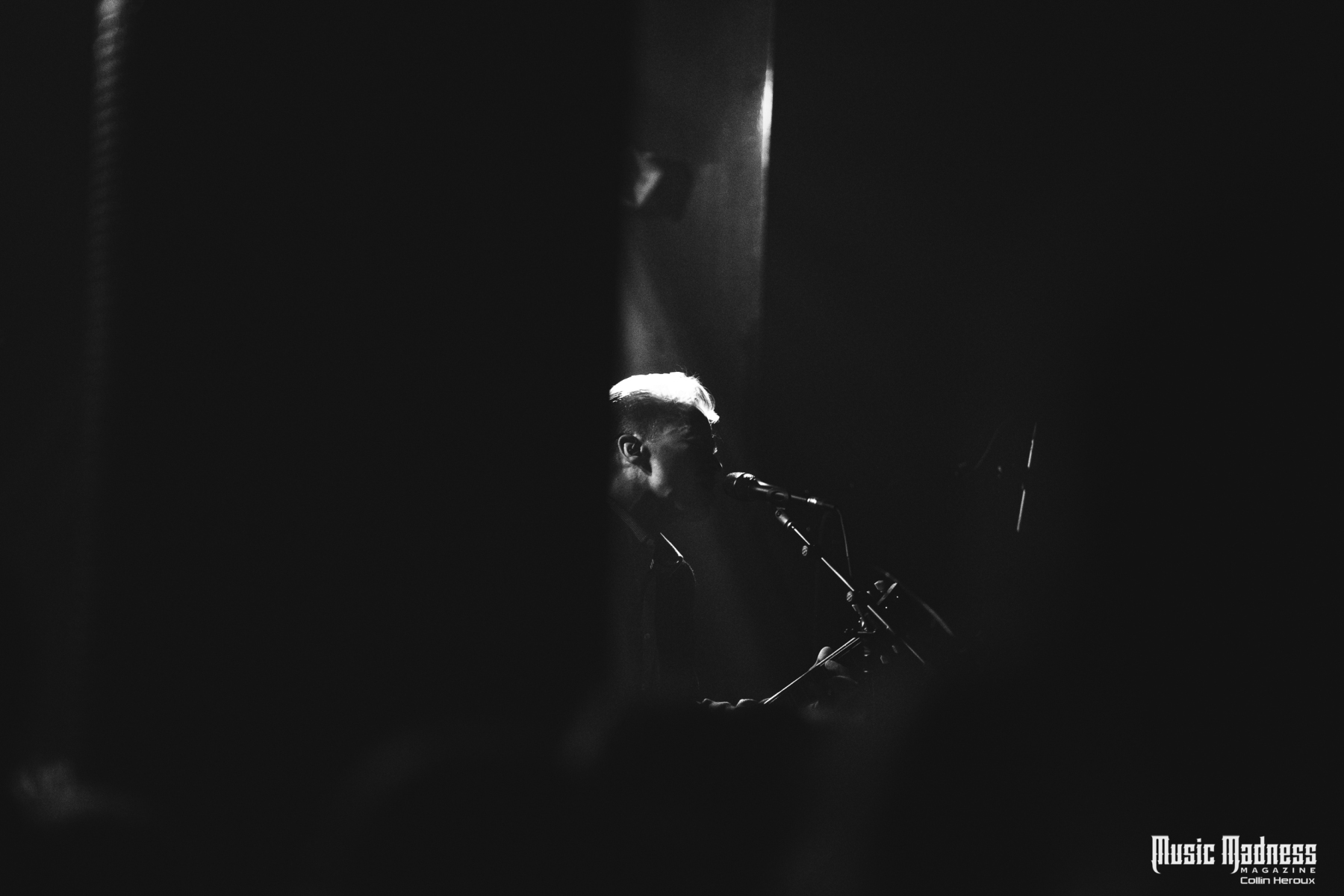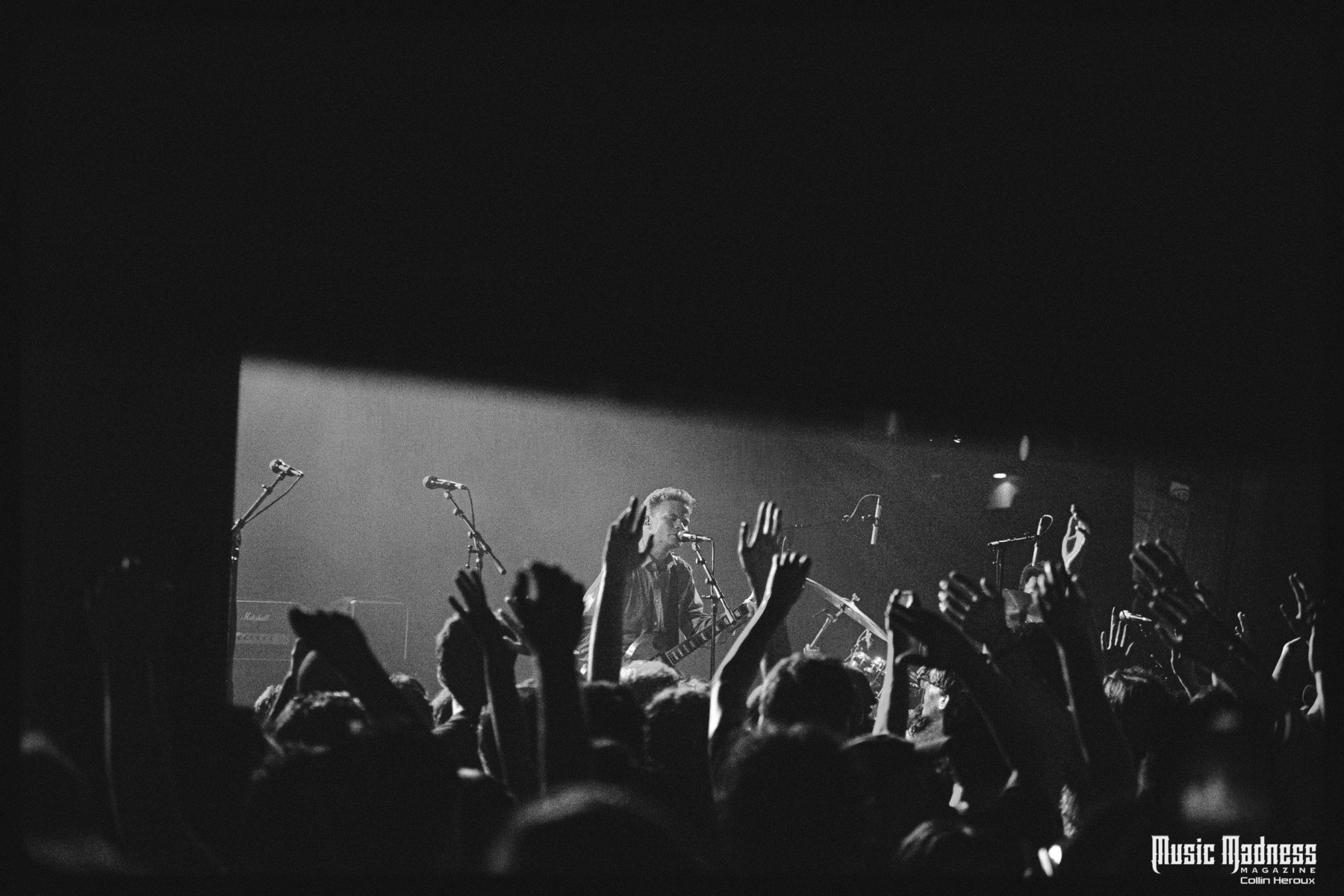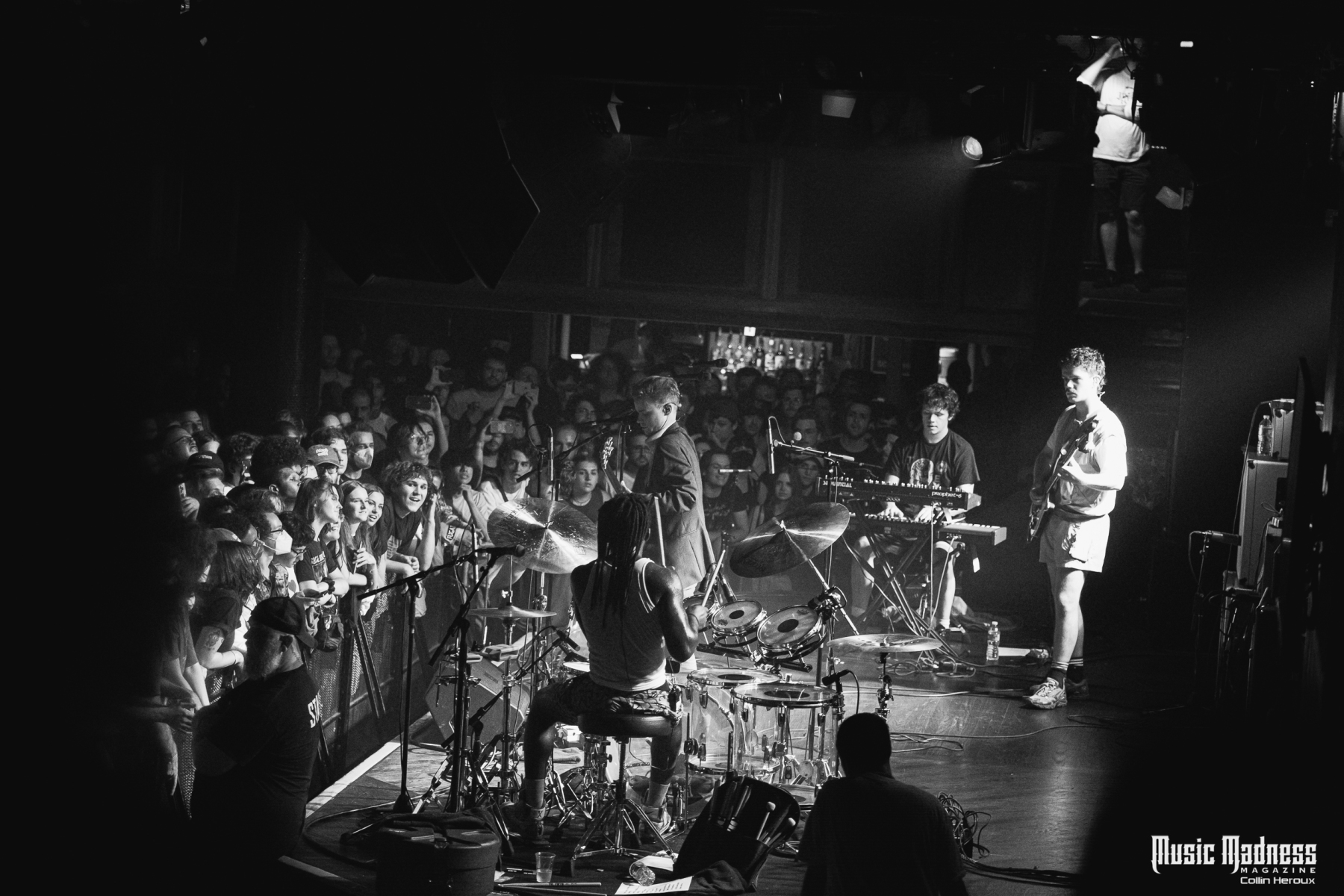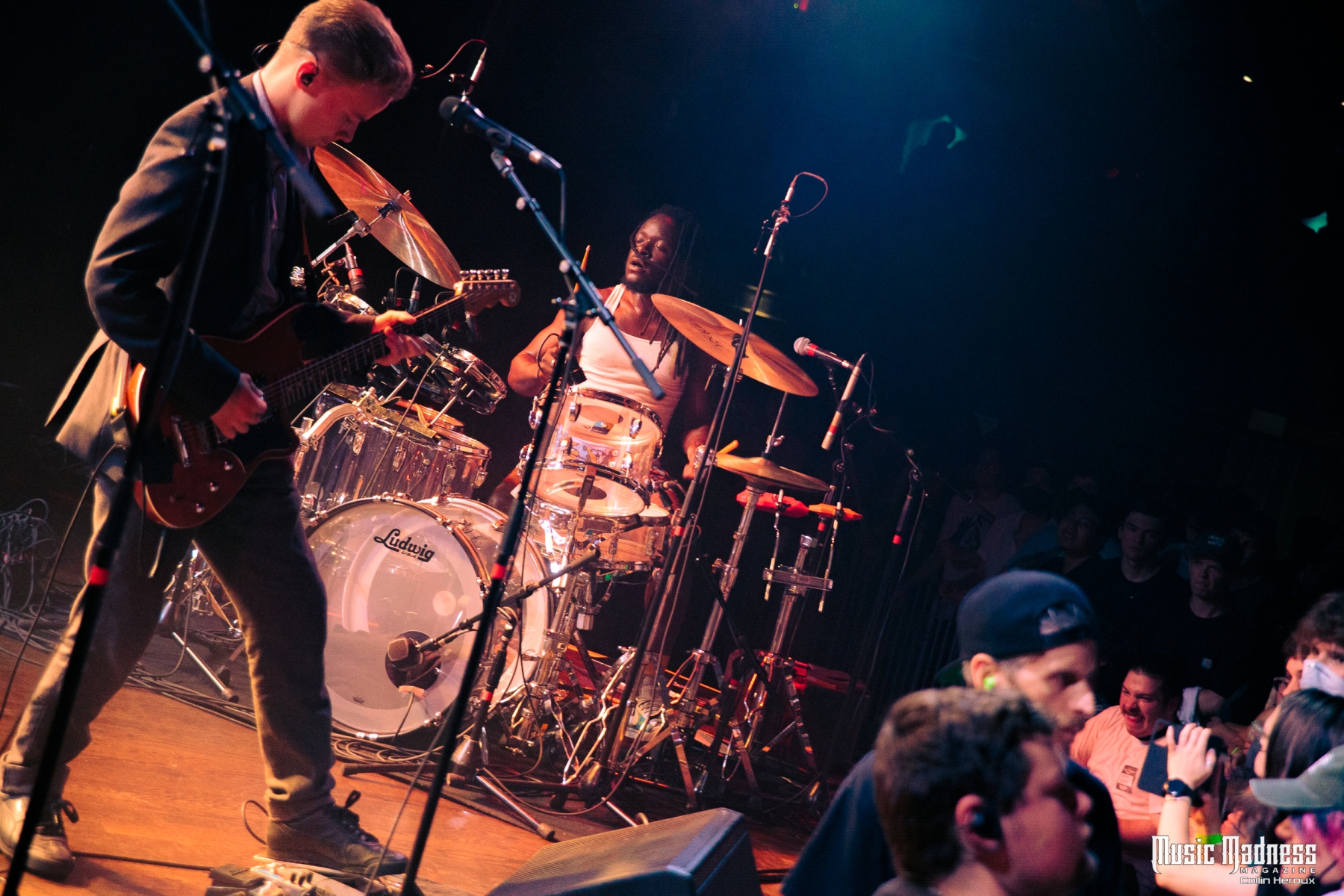
UK outfit black midi had quite the reputation to live up to even before the release of their first album, Schlagenheim, in 2019. Coming up in England’s fertile post-punk scene, their intense live performances propagated across Youtube and other unofficial outlets, earning them fast recognition – and the album more than lived up to expectations when it was finally released. Their next turn, Cavalcade, was a bit of a surprise even for the intensely creative band, pivoting from raw noise into a jazzy concoction that wasn’t afraid to slow down. In their third LP, the band have married stylist elements of each previous record, creating their most cohesive and compelling piece of work yet, and after some post-release shows in their native England, they’ve arrived in the US to showcase the new record stateside for the first time after teasing it a bit earlier this year.
Entitled Hellfire, the album is unsurprisingly obsessed with the concept of sin – or more precisely, the people who commit it. Each track is essentially its own vaudevillian vignette highlighting tragedy and those who feast on it – there’s an assassination at a boxing match where the killer declares it’s the audience who’s won, not even the surviving combatant; a military drama in which an officer entices, uses, and discards his conscripts even as they’ve watched their friends evaporated into pink mist; and a farmhand tricked by the devil himself into committing a murder at the cost of his soul. The album is awash in high drama and theatrics, and perhaps its most powerful sentiment is in the closing track where a crowd from all walks of life gathers in an actual theatre to watch a has-been star read his last will. After a vividly described, lengthy production he sets out to pose 27 final questions of varying depth — he bloats and dies before he can finish, but all the audience can do is laugh, closing off this anthology of an album in a fittingly callous fashion.
Despite the triumph of the latest record, they open their first American show of the tour with a pair of songs from Schlagenheim, both ‘953’ and ‘Speedway’ – interestingly recontextualized is the final line of the former: “it is condemned / it is a sin, it is a sin”. The first taste of Hellfire for the evening arrives in the form of ‘Welcome to Hell’, where a jazzy, Beefheart-inspired riff gets supplanted by orchestral swells and chaotic guitars as a narration of a debaucherous night by vocalist/guitarist Geordie Greep dawns into a day of military men seeing “limbs rendered birds by the speed they flew off” in the fray. This stylistic mutation of prog-rock and jazz has, over the last two records, become a hallmark of the black midi sound, and Greep, bassist/vocalist Cameron Picton, and drummer Morgan Simpson make it happen by often playing at speeds one has to see to believe could be performed live by human hands. It fits Greep’s vocal tendency to speak at an equally frantic pace, embodied best by ‘The Race is About to Begin’, the seven-minute Hellfire centerpiece where with the cadence of a racetrack announcer he chronicles the endless sameness of the life of Tristan Bongo, the private who is so thoroughly traumatized in ‘Welcome to Hell’, making reference both to the band’s other tracks and albums, wading further into the concept-album waters.
For all its manic energy, however, some of Hellfire’s finest moments arrive in its slower songs, like ‘Still’, the gently-sung ballad that sees Picton take lead-up vocals and acoustic guitar while Greep handles the bass. Their handing-off of lead vocal duty has long been a potent dynamic, perhaps one of this generation’s analogues to the Krug/Boeckner interplay that has always made Wolf Parade’s music so compelling. Oftentimes when Picton has the lead, Greep will step back on the stage and stare off trancelike, as if the two are trading off the parts of one collective mind – although it would be a sin not to note how, despite never having the luxury of immobility, Simpson’s inimitable drumming is just as core to the composition of each piece. Even prior to the release of Schlagenheim, his playing was hailed in the UK as some of the most inventive and skillful drumming in contemporary times, and he’s never given the listener any reason to doubt that sentiment.
From the moment the setlists were placed onstage, blowing in the wind of the fans trying (mostly in futility) to guard against the blistering New England summer heat, anyone with proximity enough to see had been excitingly murmuring about the listing of ‘Near DT, MI’ proximal to the end of the setlist. It’s another one that finds Picton on vocals, a brief, heated, and violent excoriation of the state of affairs in Flint, MI, where a criminally-neglected water crisis left city residents subject to lead poisoning for years on end. It has always stood out in the black midi catalog as their most pointed, political song, though now it seems like a seed of the band’s collective fascination with the sins people will commit against one another. Even alone it’s a powerhouse of a song, but sandwiched as it is in Boston between ‘Chrondomalacia Patella’ and ‘John L’ – both off of Cavalcade – it’s an absolutely monstrous block of some of the band’s most intense work.
For ‘John L’, Greep changes up the lyrics of the song, tossing in a line encouraging people to “find a dance partner” – in a recent tweet, Greep expressed some disdain for moshing, though ironically it’d be a bit difficult to dance to this rendition of ‘John L’, as it seems to get faster and faster as it approaches its conclusion like the band is speedrunning its own song – slowing only to pepper in a medley of classic rock riffs before the finish; they also performed a truncated rendition of ZZ Top’s ‘La Grange’ earlier in the evening. More suitable for dancing, at least from a beats-per-minute angle if not a lyrical one, is ‘The Defence’, the penultimate song of the evening that starts with just Greep and keyboardist Seth Evans. Another of the album’s slower moments, it’s Greep at his most gorgeously operatic. Written from the perspective of the proprietor of a brothel, it’s a sweeping appeal that rises into a chorus that is the establishment’s come-hither call into the night: “Prostrate, supine… whatever you like!” It’s an examination of narcissism, a person congratulating themselves for saving these workers from being dead or “in chains”, only to offer them up in whatever configuration to men they themselves recognize as “pathetic”. The range here, both vocally and tonally, is deeply impressive and suggests that black midi would find as much success scoring a Baz Luhrmann period piece as they have among the post-punk faithful.
With the evening drawing to a close, the band elects to end with ‘Slowly’, a track that differs from its recorded version more than perhaps any other song in the set. Whereas Picton’s vocal on the album is delivered calmly, almost in monotone, in person it becomes a snarl that directly competes with the blaring alarm formed by the guitars, the kind of crushing repetition that the band have always employed to maximum effect. After the band leaves the stage, Elvis Presley’s ‘Can’t Help Falling in Love’ comes over the house speakers, and in belated adherence to Greep’s suggestion from earlier, where once there was something of a mosh pit are now a few pairs of people spinning each other in circles, slow dancing.
Review and photos by Collin Heroux
















